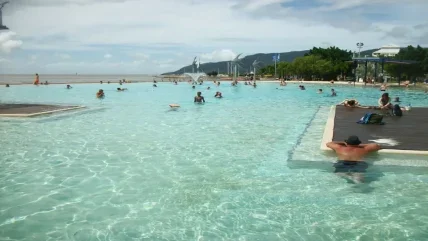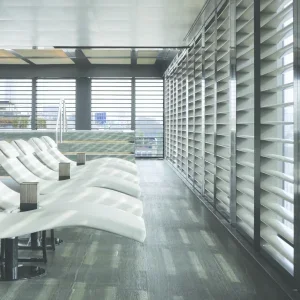
When it comes to operating a swimming pool, having a regular supply of the correct chemicals on hand to keep it in good condition is vital. Lack of maintenance and the incorrect use of chemicals could make your pool unsuitable for swimming, as well as allowing algae and bacteria to build up.
And, while having the right pool chemicals is important, it is also essential that they are stored in a safe place. This means keeping all solutions and chemical bottles out of the reach of unauthorised personnel and stored in accordance with HSE legislation and best health and safety practices.
Follow this guide for an overview and top tips to ensure your swimming pool chemicals are stored safely.
Where can I store swimming pool chemicals?
Generally speaking, the best place to store your chemicals is in a well-ventilated and dry area such as a lockable cabinet. Ideally this should also have shelving so that each chemical can be stored separately from others.
Keeping space between each chemical is recommended as this helps to prevent any contamination in the event of a spill. Concentrated chemicals carry a high risk of reaction if they are mixed, so keeping distance between containers is preferable.
Should I store my chemicals indoors or outdoors?
The answer to this greatly depends on the overall climate where you live. If you are based in a country where daily temperatures are considered moderate (between 4oC and 16oC) all year round then yes, it is safe to store them outdoors. However, if you live in a place where the climate fluctuates more severely, it is best to keep your swimming pool chemicals stored inside.
In a cold climate, keeping your pool chemicals outside runs the risk of them freezing, which makes them both unsuitable and unsafe for use. In hotter climates, swimming pool chemicals should be kept at temperatures no greater than 35oC. According to the Health and Safety Executive (HSE), the UK government agency for workplace health, safety and welfare, some chemicals used for pool water treatment – such as calcium hypochlorite and bromochlorodimethylhydantoin – can carry the risk of explosion or fire if stored incorrectly.
To prevent this, make sure all chemicals are stored out of direct sunlight and in a dry place. It is also important to keep all pool chemicals away from any sources of heat or ignition to minimise the risk of dangerous consequences.
Another point to consider when storing chemicals indoors is ventilation. Keeping your chemicals in a closed space can cause a build-up of harmful gasses and with many chemicals now supplied in breathable containers, you need to be certain your storage area is properly ventilated.
Which type of storage containers are best?
All swimming pool chemicals should be stored in their original containers. Never pour one type of chemical into another container, or mix any two chemicals together, as this could be very dangerous to both yourself and your surrounding environment.
Many chemicals come in specially designed containers to keep them safe. Transferring them to other containers could cause a reaction to form hazardous gases or other compounds.
For the safest storage option, you can place each chemical (in its original container) into a separate hard plastic bin with a tight-fitting lid. These containers should then be stored in a very well ventilated area to avoid any exposure to built-up gas when they need to be opened and used.
Make sure to keep the manufacturer’s label visible on each container and, if unsure, you can refer to the manufacturer’s Material Safety Data Sheet (MSDS) or the Control of Substances Hazardous to Health (COSHH) risk assessment.
Can I keep pool chemicals near my swimming pool?
Pool chemicals should be stored as far away from your swimming pool, or any body of water, as possible. This is because if one drop of water gets into the chemical containers, it could cause a dangerous reaction which allows heat and gas to build up.
However, when these chemicals are added to large amounts of water in the right quantities, such as your swimming pool, they are very safe to use.
Storing your chemicals close to the floor also risks water from mopping or splashing getting into them. This is another reason why chemicals should be kept in suitable containers or lockable cabinets, away from the public.
Top tips for safe pool chemical storage
· Always store chemicals in the original containers with their manufacturer’s label and consult with the chemical manufacturer if the container is damaged.
· Do not store possible ignition sources, particularly petrol, diesel, or gas-based equipment near the chemicals.
· Store pool chemicals in a secure and safe place, and out of the reach of children.
· Make sure the relevant COSSH information and/or Material Safety Data Sheets are clearly displayed.
· Never allow any type of chlorine to come into contact with any type of acid, except when in the normal quantities found in pool water.
· Test the water in your pool with a reliable test kit regularly to ensure safe use. The more often the pool is used, the more often it should be tested.
Final word
Always ensure you check appropriate COSHH regulations and HSE (Health and Safety Executive) regulations as well referring closely to the manufacturer’s information provided with your swimming pool chemicals for specific advice. This info may well contain specific storage instructions and remember to always have necessary safety guidelines displayed on or next to your swimming pool chemical containers.
Author Bio: First Mats started life as safety matting specialists, but have since expanded to become a complete industrial and commercial supplies company. The focus of First Mats is to provide safety-focused products that improve the wellbeing of staff through quality approved products, backed up by extensive knowledge. www.firstmats.co.uk






